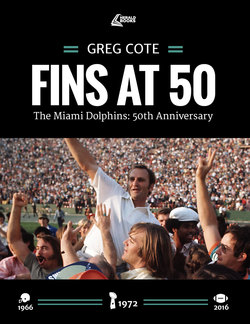Читать книгу FINS AT 50 - Greg Cote - Страница 10
На сайте Литреса книга снята с продажи.
Оглавление9
“Is there a noticeable change when the sun comes up?” he said.
Jarringly the team went from a laissez faire head coach and a losing mindset to a coach staging four practices a day, abiding no excuses, suffering no fools and demanding a champion’s mentality.
“With Wilson if it was hot we’d go swimming,” as the great running back Mercury Morris put it. “With Shula we didn’t have a drink of water on the field in six years.”
More serendipity shaping Dolphins history: It took the biggest defeat of Shula’s life to lead to the best move of his career.
He’d coached the Baltimore Colts in the 1968-season Super Bowl played at the Orange Bowl — the wrong end of Joe Namath’s famous “guarantee” in a huge upset loss to the New York Jets. That soured Shula’s relationship with Colts owner Carroll Rosenbloom — or else he’d almost certainly have remained where he was and Robbie would have had to hire someone else to replace Wilson.
Had Shula not lost that game to Namath, “I might still be in Baltimore eating crab cakes,” Shula told me in the fall of 2015, smiling.
The Dolphins won right away under Shula, and reached the Super Bowl in only his second year in Miami, albeit losing big to Dallas.
The next season, all they were was Perfect.
The year after, they were champions yet again.
“Some say the bitterness [of losing that Super Bowl to Dallas] drove us,” Csonka said. “No. Don Shula is what drove us.”
When Shula took that iconic victory ride on his players’ shoulders to cap the Perfect Season, Miami rode with him.
The once woeful and largely ignored expansion Dolphins had bloomed into NFL powers, and the team lifted an entire city. Miami suddenly was on the national sports map.
The franchise’s greatest success was front-loaded, alas. Shula would spend the remainder of his 26 years with the Dolphins trying in vain to win a third Super Bowl title.
“Wish we could have won maybe one or two more games,” is how the all-time winningest coach answers when asked about any regrets.
Doing that seemed likely, even inevitable, when the generational talent, Dan Marino, was drafted in 1983. He arrived a handsome, curly-haired Italian kid out of blue-collar Pittsburgh, became the most popular player in franchise history, and left owning most every major NFL passing record. But he would retire 16 seasons later, at age 38, without the ring he so wanted.
Marino led the Fins to a Super Bowl in only his second season, 1984, but lost to San Francisco.
“I figured we’d be back a lot more,” he said.
It never happened; that would be Marino’s only Super Bowl appearance. It is not well known that losing Super Bowl teams are given rings, too.
Marino has never worn his.
In ’85 Miami won maybe the most famous regular-season game in its history, a December triumph that denied the Chicago Bears a shot to equal the ’72 Perfect Season. But the Dolphins lost in the AFC Championship Game that year.
In 1987 the Dolphins left the decaying Orange Bowl for the less intimate new stadium that Robbie – who died in 1990 and would have turned 100 this July – built with
